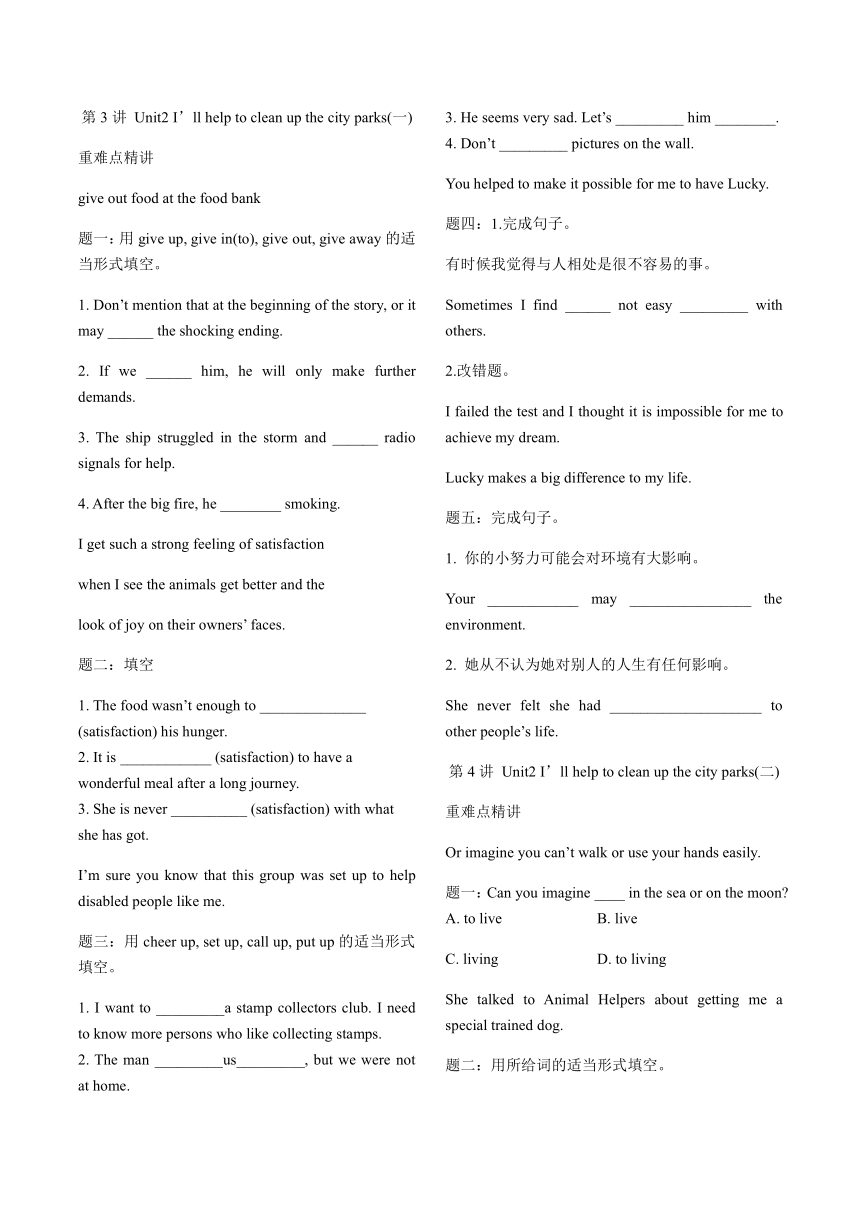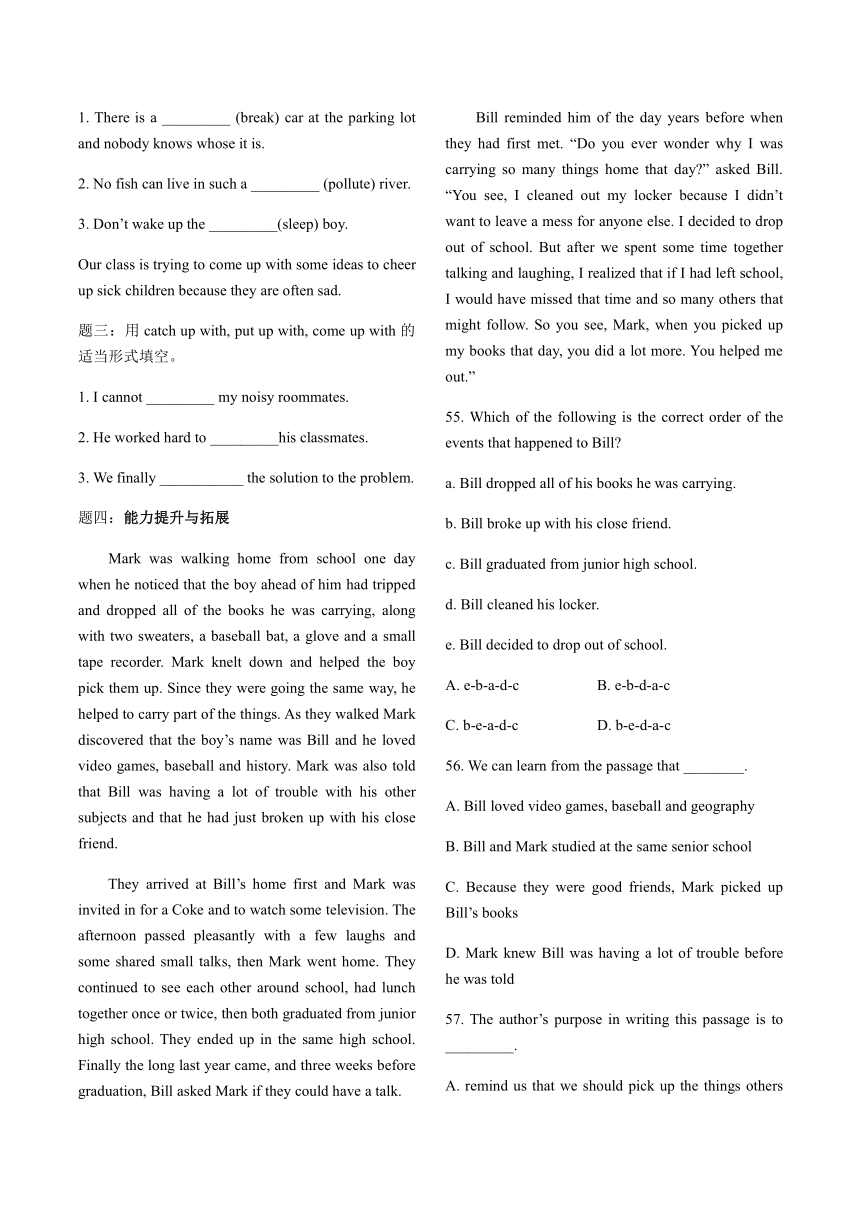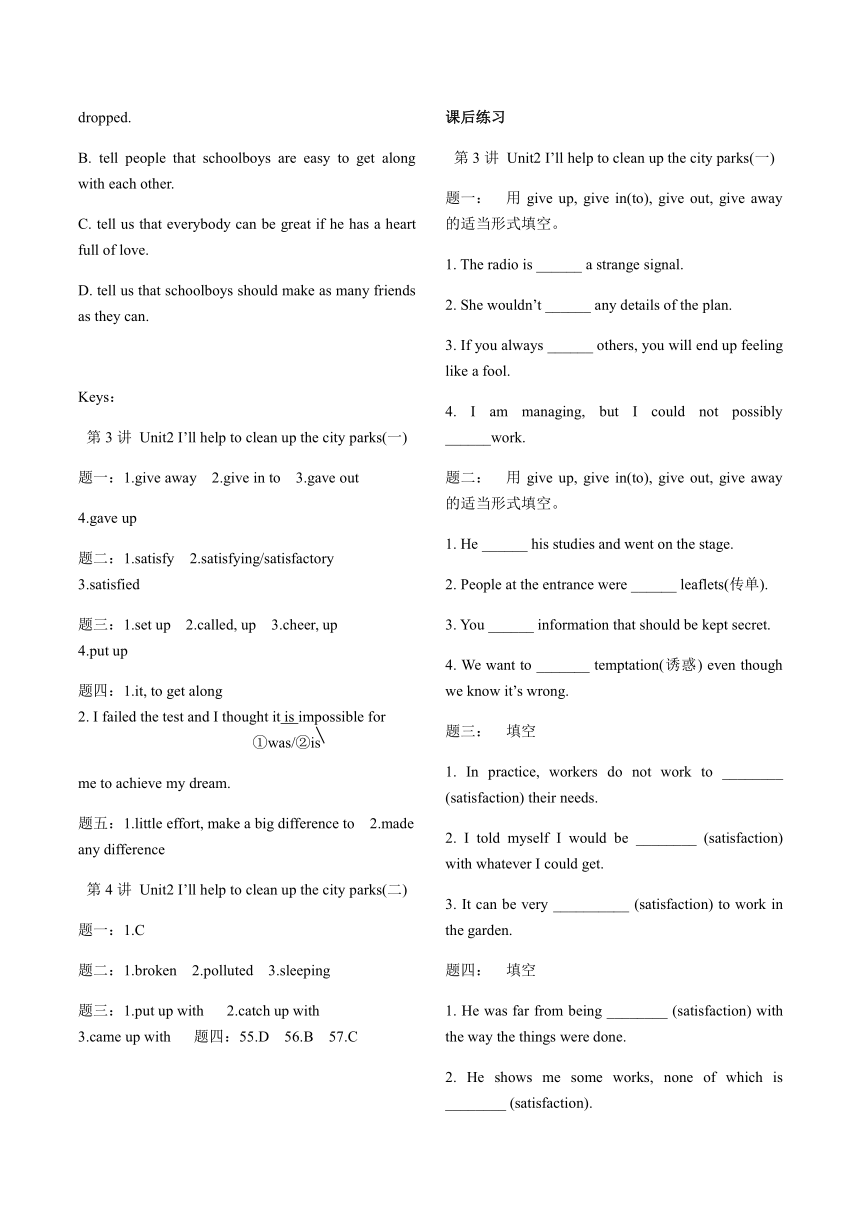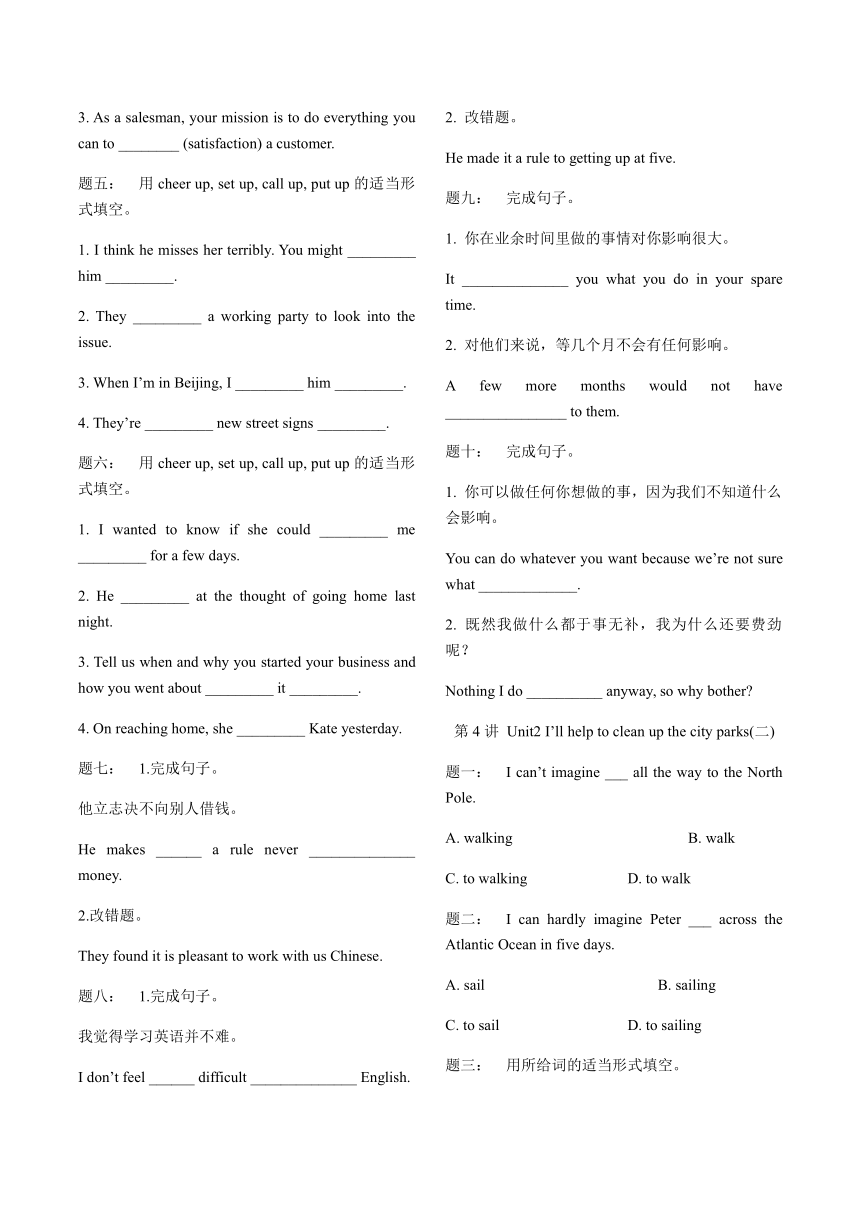人教版八年级下册Unit2 I’ll help to clean up the city parks讲义练习(含答案)
文档属性
| 名称 | 人教版八年级下册Unit2 I’ll help to clean up the city parks讲义练习(含答案) |

|
|
| 格式 | zip | ||
| 文件大小 | 59.5KB | ||
| 资源类型 | 教案 | ||
| 版本资源 | 人教新目标(Go for it)版 | ||
| 科目 | 英语 | ||
| 更新时间 | 2020-02-14 00:00:00 | ||
图片预览




文档简介
第3讲 Unit2 I’ll help to clean up the city parks(一)
重难点精讲
give out food at the food bank
题一:用give up, give in(to), give out, give away的适当形式填空。
1. Don’t mention that at the beginning of the story, or it may ______ the shocking ending.
2. If we ______ him, he will only make further demands.
3. The ship struggled in the storm and ______ radio signals for help.
4. After the big fire, he ________ smoking.
I get such a strong feeling of satisfaction
when I see the animals get better and the
look of joy on their owners’ faces.
题二:填空
1. The food wasn’t enough to ______________ (satisfaction) his hunger.
2. It is ____________ (satisfaction) to have a wonderful meal after a long journey.
3. She is never __________ (satisfaction) with what she has got.
I’m sure you know that this group was set up to help disabled people like me.
题三:用cheer up, set up, call up, put up的适当形式填空。
1. I want to _________a stamp collectors club. I need to know more persons who like collecting stamps.
2. The man _________us_________, but we were not at home.
3. He seems very sad. Let’s _________ him ________.
4. Don’t _________ pictures on the wall.
You helped to make it possible for me to have Lucky.
题四:1.完成句子。
有时候我觉得与人相处是很不容易的事。
Sometimes I find ______ not easy _________ with others.
2.改错题。
I failed the test and I thought it is impossible for me to achieve my dream.
Lucky makes a big difference to my life.
题五:完成句子。
1. 你的小努力可能会对环境有大影响。
Your ____________ may ________________ the environment.
2. 她从不认为她对别人的人生有任何影响。
She never felt she had ____________________ to other people’s life.
第4讲 Unit2 I’ll help to clean up the city parks(二)
重难点精讲
Or imagine you can’t walk or use your hands easily.
题一:Can you imagine ____ in the sea or on the moon?
A. to live B. live
C. living D. to living
She talked to Animal Helpers about getting me a special trained dog.
题二:用所给词的适当形式填空。
1. There is a _________ (break) car at the parking lot and nobody knows whose it is.
2. No fish can live in such a _________ (pollute) river.
3. Don’t wake up the _________(sleep) boy.
Our class is trying to come up with some ideas to cheer up sick children because they are often sad.
题三:用catch up with, put up with, come up with的适当形式填空。
1. I cannot _________ my noisy roommates.
2. He worked hard to _________his classmates.
3. We finally ___________ the solution to the problem.
题四:能力提升与拓展
Mark was walking home from school one day when he noticed that the boy ahead of him had tripped and dropped all of the books he was carrying, along with two sweaters, a baseball bat, a glove and a small tape recorder. Mark knelt down and helped the boy pick them up. Since they were going the same way, he helped to carry part of the things. As they walked Mark discovered that the boy’s name was Bill and he loved video games, baseball and history. Mark was also told that Bill was having a lot of trouble with his other subjects and that he had just broken up with his close friend.
They arrived at Bill’s home first and Mark was invited in for a Coke and to watch some television. The afternoon passed pleasantly with a few laughs and some shared small talks, then Mark went home. They continued to see each other around school, had lunch together once or twice, then both graduated from junior high school. They ended up in the same high school. Finally the long last year came, and three weeks before graduation, Bill asked Mark if they could have a talk.
Bill reminded him of the day years before when they had first met. “Do you ever wonder why I was carrying so many things home that day?” asked Bill. “You see, I cleaned out my locker because I didn’t want to leave a mess for anyone else. I decided to drop out of school. But after we spent some time together talking and laughing, I realized that if I had left school, I would have missed that time and so many others that might follow. So you see, Mark, when you picked up my books that day, you did a lot more. You helped me out.”
55. Which of the following is the correct order of the events that happened to Bill?
a. Bill dropped all of his books he was carrying.
b. Bill broke up with his close friend.
c. Bill graduated from junior high school.
d. Bill cleaned his locker.
e. Bill decided to drop out of school.
A. e-b-a-d-c B. e-b-d-a-c
C. b-e-a-d-c D. b-e-d-a-c
56. We can learn from the passage that ________.
A. Bill loved video games, baseball and geography
B. Bill and Mark studied at the same senior school
C. Because they were good friends, Mark picked up Bill’s books
D. Mark knew Bill was having a lot of trouble before he was told
57. The author’s purpose in writing this passage is to _________.
A. remind us that we should pick up the things others dropped.
B. tell people that schoolboys are easy to get along with each other.
C. tell us that everybody can be great if he has a heart full of love.
D. tell us that schoolboys should make as many friends as they can.
Keys:
第3讲 Unit2 I’ll help to clean up the city parks(一)
题一:1.give away 2.give in to 3.gave out
4.gave up
题二:1.satisfy 2.satisfying/satisfactory
3.satisfied
题三:1.set up 2.called, up 3.cheer, up
4.put up
题四:1.it, to get along
2. I failed the test and I thought it is impossible for
①was/②is
me to achieve my dream.
题五:1.little effort, make a big difference to 2.made any difference
第4讲 Unit2 I’ll help to clean up the city parks(二)
题一:1.C
题二:1.broken 2.polluted 3.sleeping
题三:1.put up with 2.catch up with
3.came up with 题四:55.D 56.B 57.C
课后练习
第3讲 Unit2 I’ll help to clean up the city parks(一)
题1: 用give up, give in(to), give out, give away的适当形式填空。
1. The radio is ______ a strange signal.
2. She wouldn’t ______ any details of the plan.
3. If you always ______ others, you will end up feeling like a fool.
4. I am managing, but I could not possibly ______work.
题2: 用give up, give in(to), give out, give away的适当形式填空。
1. He ______ his studies and went on the stage.
2. People at the entrance were ______ leaflets(传单).
3. You ______ information that should be kept secret.
4. We want to _______ temptation(诱惑) even though we know it’s wrong.
题3: 填空
1. In practice, workers do not work to ________ (satisfaction) their needs.
2. I told myself I would be ________ (satisfaction) with whatever I could get.
3. It can be very __________ (satisfaction) to work in the garden.
题4: 填空
1. He was far from being ________ (satisfaction) with the way the things were done.
2. He shows me some works, none of which is ________ (satisfaction).
3. As a salesman, your mission is to do everything you can to ________ (satisfaction) a customer.
题5: 用cheer up, set up, call up, put up的适当形式填空。
1. I think he misses her terribly. You might _________ him _________.
2. They _________ a working party to look into the issue.
3. When I’m in Beijing, I _________ him _________.
4. They’re _________ new street signs _________.
题6: 用cheer up, set up, call up, put up的适当形式填空。
1. I wanted to know if she could _________ me _________ for a few days.
2. He _________ at the thought of going home last night.
3. Tell us when and why you started your business and how you went about _________ it _________.
4. On reaching home, she _________ Kate yesterday.
题7: 1.完成句子。
他立志决不向别人借钱。
He makes ______ a rule never ______________ money.
2.改错题。
They found it is pleasant to work with us Chinese.
题8: 1.完成句子。
我觉得学习英语并不难。
I don’t feel ______ difficult ______________ English.
2. 改错题。
He made it a rule to getting up at five.
题9: 完成句子。
1. 你在业余时间里做的事情对你影响很大。
It ______________ you what you do in your spare time.
2. 对他们来说,等几个月不会有任何影响。
A few more months would not have ________________ to them.
题10: 完成句子。
1. 你可以做任何你想做的事,因为我们不知道什么会影响。
You can do whatever you want because we’re not sure what _____________.
2. 既然我做什么都于事无补,我为什么还要费劲呢?
Nothing I do __________ anyway, so why bother?
第4讲 Unit2 I’ll help to clean up the city parks(二)
题1: I can’t imagine ___ all the way to the North Pole.
A. walking B. walk
C. to walking D. to walk
题2: I can hardly imagine Peter ___ across the Atlantic Ocean in five days.
A. sail B. sailing
C. to sail D. to sailing
题3: 用所给词的适当形式填空。
1. It is probably the most _________ (pollute) body of water in the world.
2. Eric could only respond in _________ (break) English.
3. She was still tired and _________(sleep) when he woke her.
题4: 用所给词的适当形式填空。
1. My friend is a _________(return) student.
2. They are cleaning the _________(fall) leaves in the yard.
3. The pleasant cool under the trees refreshed(恢复精力) the_________(tire) boy.
题5: 用catch up with, put up with, come up with的适当形式填空。
1. Don’t just try to _________ your toothache. Go and see the dentist.
2. Keep your eye on these jokers, you never know what they will _________.
3. We’ll do our best to _________ the world levels.
题6: 用catch up with, put up with, come up with的适当形式填空。
1. No one has _________ an answer as to why this should be so.
2. If a good runner like you can’t _________ him, how can I?
3. I can _________ the house being untidy, but I hate it if it’s not clean.
题7:
A hobby can be almost anything that a person likes to do in his free time. Hobbyists raise pets, watch birds, paint pictures, play the piano and grow flowers. They also go to concerts, climb mountains, go fishing, skate and swim. They collect everything from books to butterflies and from boxes to stamps.
People follow hobbies because these activities offer enjoyment, friendship, knowledge and relaxation. Sometimes they even make money by following a hobby. Hobbies help people relax after hard work, and provide a balance between work and play. Hobbies also offer interesting activities for persons who are retired. Anyone, rich or poor, old or young, can follow an interesting hobby.
Hobbies can also help a patient to keep healthy. Doctors have found that hobbies are useful in helping patients (病人) recover from illness. Hobbies give patients who can’t move around something to do, and provide interests that keep them from thinking about themselves. Many hospitals treat (治疗) patients by having them take up interesting hobbies. Anyone, old or young, sick or well, rich or poor, can follow a good hobby, in spite of his age, health or money.
In early times, most people were too busy making a living to have many hobbies. But some persons who had spare time did enjoy hobbies. People today have more time than ever before for hobbies. Machines have now reduced much time that people must spend on their jobs. More people retire at an earlier age than before. Those who have developed hobbies never need to worry about what to do with their newly-found free time hours.
Sir William Osler, a famous Canadian doctor expressed the value of hobbies by saying, “No man is really happy or safe without a hobby. ”
55. Which of the following is TRUE?
A. A hobby is a kind of activity that a person likes to do in his free time.
B. A hobby is one’s regular activity in his office.
C. A hobby is a kind of activity only for old people.
D. A hobby is a kind of activity only for young people.
56. In early times, most people spent less time on their hobbies because________.
A. they were brave
B. they were busy making a living
C. they were healthy
D. they were not interested in hobbies
57. What does the writer think about hobbies?
A. People should have hobbies in their free time.
B. Machines also have their hobbies.
C. Hobbies are popular among people in Egypt.
D. People all over the world have the same hobby.
题8:
Martin Lynch, an American businessman, had been going on vacation to a small Mexican fishing village for a number of years. One morning while going for a walk along the beach, he saw his friend Pablo Perez, a local fisherman. Martin watched Pablo unload his boat and pack the fish in a box.
Martin noticed Pablo was smiling and looked very happy. He could also see several large fish in the boat. Martin greeted Pablo and asked how long it took to catch the fish. “Just a few hours,” replied Pablo. Martin asked, “Why didn’t you stay longer and catch more fish?” “I have enough for my family,” Pablo said. “And what do you do with the rest of your day?” asked Martin. “I take a nap, play with my children, spend time with my wife, and go into the village to see my friends and play cards, I have a full and busy life.” Martin explained that if Pablo worked longer hours and caught more fish, he could make more money. With the extra money, Pablo could buy more boats and catch much more fish. By selling the fish, Pablo could open his own factory and sell direct to supermarkets.
“Then what?” asked Pablo. “Well you would probably have to move to Mexico City to run the business. Finally, you would be able to sell your business and make millions of dollars,” replied Martin. “How long will that take?” asked Pablo.
Martin thought for a while and said it would probably take at least 15 years.
“And then what?” asked Pablo.
“Well, that’s the best part,” Martin said. “You will be able to retire, buy a house near the ocean, sleep longer, play with your children, spend more time with your wife, see your friends, and play cards.”
55. What is the story mainly about?
A. A businessman and a fisherman have become friends.
B. A businessman learns how to fish from a fisherman.
C. A businessman wants to become a businessman.
D. A businessman gives advice to a fisherman.
56. How can the fisherman make more money in the businessman’s view?
A. By buying a supermarket.
B. To move to Mexico City.
C. By selling his own business.
D. To work longer and catch more fish.
57. We can infer from the passage that _______.
A. the fisherman will stay the same with his life
B. the fisherman will leave the village for Mexico City
C. the business man will buy the fisherman’s boat
D. it takes all day for the fisherman to catch large fish
Keys:
第3讲 Unit2 I’ll help to clean up the city
parks(一)
题1: 1. giving out 2. give away
3. give in to 4.give up
解析:1. 句意为“收音机正发出一种奇怪的信号。”give out发出。时态为现在进行时,填giving out。
2. 句意为“她不愿泄露该计划的任何细节。”give away泄露。would后接动词原形。
3. 句意为“如果你总是屈服于人,你最终会觉得自己像一个傻子。”give in to屈服于,向……让步。
4. 句意为“我正在努力应付,但我不可能放弃工作。”give up放弃。
题2: 1. gave up 2. giving out 3. gave away
4. give in to
解析:1. 句意为“他不再读书而去当演员了。”give up放弃。时态为一般过去时,填gave up。
2. 句意为“有人在入口处分发传单。”give out分发。时态为过去进行时,填giving out。
3. 句意为“你泄露了应该保密的信息。”gave away泄露。
4. 句意为“纵然我们明知道不对,却仍想屈服于诱惑。”give in to屈服于,向……让步。
题3: 1.satisfy 2. satisfied 3. satisfying
解析:1. 句意为“事实上,工人工作并不是为了满足本身的需要。”satisfy是动词“满足”的意思。
2. 句意为“我告诉自己,不管得到什么我都会心满意足的。”satisfied是形容词“感到满足”的意思。常用搭配是sb. be satisfied with某人对……感到满足。
3. 句意为“在花园里工作可以让人十分满足。”satisfying是形容词“令人满意的”的意思,主语是物。
题4: 1. satisfied 2.satisfying 3. satisfy
解析:1. 句意为“这几件事办得太不遂他的心了。”satisfied是形容词“感到满足”的意思。常用搭配是sb. be satisfied with某人对……感到满足。
2. 句意为“他向我展示了一些作品,其中没有一个是令人满意的。”satisfying是形容词“令人满意的”的意思,主语是物。
3. 句意为“作为推销员,你的使命是竭尽全力让顾客满意。”satisfy是动词“满足”的意思。
题5: 1. cheer, up 2. set up 3. will call, up
4.putting, up
解析:1. 句意为“我想他是太想念她了。你可以让他高兴起来。”cheer up使高兴;使振奋。
2. 句意为“他们设立了一个工作组来调查这个问题。”set up创建,成立。
3. 句意为“当我到北京后,我会给他打电话。”call up打电话。
4. 句意为“他们正在张贴新的路标。”put up张贴,留宿。时态为现在进行时,填putting; up。
题6: 1. put, up 2. cheered up 3. setting, up
4. called up
解析:1. 句意为“我想知道她是否可以让我住几天。”put up提供住宿。
2. 句意为“昨晚他一想到回家,心里就高兴起来。”cheer up使高兴;使振奋。时态为一般过去时,填cheered up。
3. 句意为“告诉我们你是何时出于何种原因开办了自己的企业,又是如何着手创建的。”set up创建,成立。about是介词,介词后接动词ing形式。
4. 句意为“昨天到家后,她给凯特打了个电话。”call up打电话。时态为一般过去时,填called up。
题7: 1. it; to borrow
2. They found it is pleasant to work with us
①was/②is
Chinese.
解析:1.it作形式宾语,真正的宾语是不定式。
2.形式宾语的基本结构为“动词+it+宾语补足语+不定式”。把is改为was 或者去掉it后的be动词,在时态上保持一致。
题8: 1. it; to learn
2. He made it a rule to getting up at five.
get
解析:1.it作形式宾语,真正的宾语是不定式。
2.形式宾语的基本结构为“动词+it+宾语补足语+不定式”。宾语补足语后接的是不定式,故把getting改为get。
题9: 1. makes a big difference to
2.made any difference
解析:1. make a big difference to sb.对某人有很大的影响。主语是it,谓语动词用第三人称单数形式。
2. make a difference to sb.对某人有影响。时态为现在完成时,又因句子是否定句,应填made any difference。
题10: 1. makes a difference
2. makes any difference
解析:1. make a difference有影响。主语是what,谓语动词用第三人称单数形式。
2. make a difference有影响。主语是nothing,谓语动词用第三人称单数形式。
第4讲 Unit2 I’ll help to clean up the city
parks(二)
题1: A
解析:句意为“我无法想象怎样一路走到北极去。”imagine (sb./sb.’s) doing sth.想象(某人)做某事。所以选walking。
题2: B
解析:句意为“我几乎不能想象彼得在五天内就横渡了大西洋。” imagine (sb./sb.’s) doing sth.想象(某人)做某事。所以选sailing。
题3: 1. polluted 2. broken 3.sleepy
解析:1. 句意为“这很可能是世界上受污染最严重的一片水域。”polluted是形容词“受污染的;被玷污的”的意思。
2. 句意为“埃里克只能用不流利的英语回答。”broken是形容词“不连贯的”的意思。
3. 句意为“他叫醒她的时候,她仍然又累又困。”sleepy是形容词“欲睡的;困乏的;不活跃的”的意思。
题4: 1. returned 2. fallen 3. tired
解析:1. 句意为“我的朋友是个归国的留学生。”returned是形容词“回国的;归来的;被送回的”的意思。
2. 句意为“他们正在清扫院子里的落叶。”fallen是形容词“坠落的;落下来的”的意思。
3. 句意为“树荫下宜人的清凉令那个疲倦的男孩恢复了精力。”tired是形容词“疲倦的”的意思。
题5: 1.put up with 2. come up with
3. catch up with
解析:1. 句意为“不要试着忍受你的牙疼,去牙医看看吧。”put up with忍受;容忍。
2. 句意为“留神那些活宝,你永远也不知道他们会想出什么样的主意。”come up with提出;想出。
3. 句意为“我们将努力赶上世界水平。”catch up with赶上,追上。
题6: 1. come up with 2.catch up with
3. put up with
解析:1. 句意为“对于为什么应该是这样,还没有人想出答案。”come up with提出;想出。
2. 句意为“像你一样好的赛跑者都赶不上他,何况我呢?”catch up with赶上,追上。
3. 句意为“我能忍受房子凌乱,但我讨厌它不清洁。”put up with忍受;容忍。
题7: 55. A 56. B 57. A
解析:1.由第一段第一句可知“爱好是一个人在空闲时所喜欢做的活动”。故选A。
2.由第四段第一句可知,在过去,大多数人们有很少的时间花费在爱好上,是因为人们忙于生计。故选B。
3.由末段作者引用的“No man is really happy or safe without a hobby. ”这句话可知,每个人在空闲时间都应该有爱好。故选A。
题8: 55. D 56. D 57. A
解析:55.主旨题,本题采用排除法可以在文中直接找出答案。A选项读完第一句就可以排除,这个商人和渔民已经是朋友了。B和C在文中没有任何提及,直接可以排除答案。故选D。
56.细节题,本题抓住题干的关键词in the businessman’s view,也就是说正确答案是生意人的观点。D选项在文中可以直接找到,生意人建议渔夫多工作一会儿,抓到更多的鱼,然后卖更多的鱼,赚更多的钱才能到搬到大城市,最后才能卖掉公司提早退休。A选项是对文意的曲解,生意人的意思是直接把鱼卖到超市,而不是买下超市。故选D。
57.主旨题,本文是个很有寓意的小故事,生意人以自己的眼光觉得人应该尽力工作,尽力赚更多的钱,过上更加轻松的日子。但是渔夫觉得过着忙碌充实的生活,和朋友交流,和家人聚会就觉得很满足。两人的看法不一样,所以最后渔夫还是会坚守自己的看法。故选A。
同课章节目录
- Unit 1 What's the matter?
- Section A
- Section B
- Unit 2 I'll help to clean up the city parks.
- Section A
- Section B
- Unit 3 Could you please clean your room?
- Section A
- Section B
- Unit 4 Why don't you talk to your parents?
- Section A
- Section B
- Unit 5 What were you doing when the rainstorm came
- Section A
- Section B
- Review of Units 1-5
- Unit 6 An old man tried to move the mountains.
- Section A
- Section B
- Unit 7 What's the highest mountain in the world?
- Section A
- Section B
- Unit 8 Have you read Treasure Island yet?
- Section A
- Section B
- Unit 9 Have you ever been to a museum?
- Section A
- Section B
- Unit 10 I've had this bike for three years.
- Section A
- Section B
